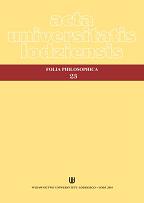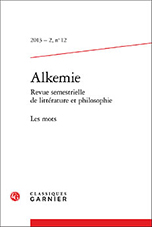Author(s): Tomasz Śliwiński / Language(s): Polish
Issue: 23/2010
Louis de la Forge, né le 24 ou le 26 novembre 1632 à La Flèche. Médecin, était anatomiste et
physiologiste, mais aussi philosophe cartésien. Un ami des Oratoriens et des Protestants à
Samour (France). Il avait été l`auteur de deux oeuvres philosophiques parmis lesquelles nous
pouvons trouver Les Remarques sur le Traité de l`Homme de René Descartes, avec des
illustrations, ainsi qu`un ouvrage essentiellment philosophique et autonome Le Traité de
l`Esprit de l`Homme, De ses Facultez et Fonctions, Et de son union avec le Corps, Suivant
les Principes de René Descartes (1644). La matière de Remarques a été largement presentée
et utilisée dans ce Traité de l`Esprit, qui a été son ouvrage fondamental. Dans sa conception
de l`âme, en tant qu`une chose qui pense, il a prouvé que les pensées de Descartes étaient
entièrement conformes à la doctrine de Saint Augustin. Le corps n`était pour lui qu`une
machine, et pour expliquer tout ce qui se passait dans un animal, il avait soutenu la thèse
qu`il suffisait de présenter tous les divers mouvements auxquels nous sommes naturellement
incités à l`occasion de l`action des objets extérieurs sur notre corps et nos sens. En somme: le
phénomène qui peut nous servir pour expliquer la machine (le fonctionnement) du corps
humain et animal, ce sont les lois de la Nature. Mais ce qui touche la nature de l`Âme, qui est
immatérielle, qui pense, qui connaît, qui raisonne, demande d`après lui des profondes
spéculations. Dans son livre ouvrage La Forge a depassé son Maitre en expliquant en détail
beaucoup de choses qui contennaient le concept de l`âme, ses fonctions, ses actions
intellectuelles, ses sentimens, et son union avec le corps. Il a rendu la connaissance de notre
esprit beaucoup plus sensible que Descartes, qui nous a donné la sienne qui parle de de notre
corps. Comme l`avait dit Descartes, l'âme est une substance pensante, tandis que le corps est
une substance étendue. Toutefois, cette distinction réelle du corps et de l'âme ne s'oppose pas
à leur union. Mais il n`a pas beaucoup parlé de cette union. La Forge au contraire, a expliqué
ce que c`était l`esprit et le corps et quelles étaient les choses qui nous faisaient connaître leur
union. De plus, il a préparé sa théorie de la relation de l’âme et du corps comme oeuvre de la
volonté divine, laquelle nous appelons l`occasionalisme.
More...


